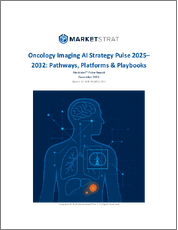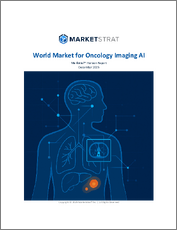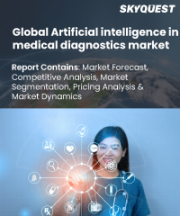
|
시장보고서
상품코드
1756477
진단용 인공지능(AI) 시장 : 컴포넌트별, 진단별, 국가별, 지역별, 산업 분석, 시장 규모, 시장 점유율(2024-2032년)Artificial Intelligence in Diagnostics Market, By Component, By Diagnosis, By Country, and By Region - Industry Analysis, Market Size, Market Share & Forecast from 2024-2032 |
||||||
보고서 하이라이트
진단용 인공지능 시장 규모는 2024년에 15억 6,712만 달러로 평가되었고, 2024-2032년에 걸쳐 CAGR 22.5%로 성장할 전망입니다.
진단에서 인공지능 시장 - 시장 역학
조기 및 정확한 질병 탐지에 대한 수요 증가
조기 및 정확한 진단에 대한 강조가 증가함에 따라 진단 분야 인공지능 시장이 성장하고 있습니다. 전 세계 의료 시스템은 환자 결과 개선과 치료 비용 절감을 위해 질병의 조기 식별을 최우선 과제로 삼고 있습니다. 인공지능은 의료 이미지, 유전적 프로파일, 전자 건강 기록 등 복잡한 데이터 세트를 신속하게 분석하여 진단 정확도를 향상시킵니다. 이 기능은 암, 심혈관 질환, 신경계 장애 등 질환의 조기 탐지에 기여합니다. 그 결과, 병원, 클리닉 및 진단 실험실은 오류를 최소화하고 진단을 가속화하며 개인 맞춤형 치료 결정을 지원하기 위해 AI 도구를 점점 더 많이 채택하고 있습니다.
진단용 인공지능 시장 - 주요 인사이트
당사의 조사 분석가에 따르면 세계 진단용 인공지능 시장은 2024-2032년 사이에 약 22.5%의 연평균 성장률(CAGR)로 성장할 전망입니다.
2024년 컴포넌트별 부문에서는 소프트웨어 부문이 시장을 독점하고 있습니다.
진단별로 방사선학 부문은 2024년에 가장 수익을 올렸습니다.
지역별로는 2024년 북미가 가장 수익이 높은 지역이었습니다.
진단에서 인공지능 시장 - 세분화 분석
세계의 인공지능 진단 시장은 컴포넌트, 진단, 지역의 세 범주로 나뉩니다.
진단에서 인공지능 시장은 컴포넌트별로 소프트웨어, 하드웨어 및 서비스로 분류됩니다. 이 중 소프트웨어는 데이터 처리, 알고리즘 실행 및 진단 결과 생성에서 중심적인 역할을 하기 때문에 주요 부문으로 부상하고 있습니다. AI 기반 소프트웨어 솔루션은 의료 이미지 해석, 실험실 결과 분석 및 임상 의사 결정 지원에 필수적입니다. 이 플랫폼들은 머신러닝을 통해 지속적으로 발전하며, 시간이 지남에 따라 정확도를 향상시키고 복잡한 진단 과제에 적응합니다. AI 소프트웨어와 병원 시스템, 전자 건강 기록(EHR), 영상 장비와의 통합이 확대되면서 시장 리더십이 강화되고 있습니다. 또한 소프트웨어 솔루션은 확장성, 원격 접근성, 비용 효율성을 제공하여, 초기 투자 비용과 인프라 지원이 필요한 하드웨어 및 서비스 컴포넌트보다 의료 제공자에게 더 매력적인 선택지로 부상하고 있습니다.
진단용 인공지능 시장은 진단별로 심장학, 종양학, 병리학, 방사선학, 흉부 및 폐, 신경학 등으로 부문별로 분류됩니다. 이 중 방사선학은 생성되는 영상 데이터의 양이 방대하고 정확한 해석이 매우 중요하기 때문에 가장 큰 비중을 차지합니다. AI는 X-레이, MRI, CT 스캔 및 초음파의 분석을 향상시켜 종양, 골절 및 내부 출혈과 같은 이상을 더 빠르고 정확하게 감지할 수 있게 함으로써 방사선학을 혁신하고 있습니다. AI 알고리즘은 미묘한 패턴을 감지하고 진단 오류를 줄일 수 있는 능력으로 방사선과 의사들에게 매우 유용한 도구입니다. 또한, 특히 만성 질환 관리 및 응급 치료 분야에서 영상 진단에 대한 수요가 증가함에 따라 방사선학 분야에서 AI의 채택이 계속 촉진되어 시장 리더십이 강화되고 있습니다.
진단용 인공지능 시장 - 지역적 인사이트
진단용 인공지능 시장은 지역적으로 북미, 아시아태평양, 라틴아메리카, 유럽, 중동 및 아프리카에 분포하고 있습니다.
북미는 주로 미국의 촉진에 힘입어 진단 시장에서의 인공 지능을 지배하고 있습니다. 이 지역은 잘 구축된 의료 인프라, AI 기술에 대한 상당한 투자, 그리고 지원적인 정부 정책의 혜택을 받고 있습니다. 선도적인 기술 기업과 신생 기업들은 병원과 협력하여 특히 방사선학 및 종양학 분야에서 첨단 진단 도구를 개발하고 있습니다. 전자 건강 기록(EHR)의 높은 채택률, 만성 질환의 유병률 증가, 정밀 의학에 대한 수요 증가는 시장 성장을 더욱 촉진하고 있습니다. FDA와 같은 규제 기관은 AI 기반 진단 도구를 적극적으로 승인하여 임상 응용에 대한 신뢰를 높이고 있습니다. 이러한 요인들은 북미 지역을 AI 기반 진단 혁신의 전 세계적 리더로 자리매김하고 있습니다.
아시아태평양 지역은 중국, 일본, 인도 등 국가를 중심으로 진단에서의 AI 시장에서의 주요 성장 지역으로 부상하고 있습니다. 의료 분야의 빠른 디지털 전환, AI 스타트업에 대한 투자 증가, 정부 차원의 건강 기술 혁신에 대한 집중이 시장 확장을 이끌고 있습니다. 이 지역은 환자 수가 많고 만성 질환의 발병률이 높아 확장 가능하고 효율적인 진단 솔루션에 대한 수요가 높습니다. 또한 중국의 AI 개발 계획과 인도의 디지털 의료 추진과 같은 이니셔티브가 생태계를 강화하고 있습니다. 지역 병원과 글로벌 기술 기업 간의 협력이 AI 채택을 가속화하여 아시아태평양을 역동적이고 빠르게 확장하는 시장으로 만들고 있습니다.
진단용 인공지능 시장 - 경쟁 구도
진단용 인공지능 시장의 경쟁 역학은 혁신을 추진하는 민첩한 신생 기업과 함께, 기존 의료 및 의료 기술 대기업에 의해 형성되고 있습니다. Siemens Healthineers, GE Healthcare, Aidoc, Digital Diagnostics, Inc.와 같은 기업들은 의료 영상, 심장학, 병리학에 중점을 둔 강력한 AI 플랫폼을 통해 시장을 지배하고 있습니다. 이러한 선두 기업들은 AI 포트폴리오를 확대하기 위해 R&D 투자, 규제 준수, 전략적 파트너십을 우선으로 하고 있습니다. 한편, Vuno, Inc.와 NovaSignal Corporation과 같은 신생 기업은 신경학과 실시간 데이터 분석 분야에서 혁신적인 솔루션을 제시하고 있습니다. 이 건강한 경쟁 구조는 제품의 지속적인 개선, 진단에서의 AI 통합 확대, 의료 전문가의 임상적 의사결정 지원 강화 등을 촉진합니다.
목차
제1장 진단 시장 개요
- 조사 범위
- 시장 추정 연도
제2장 주요 요약
- 시장 분석
- 경쟁 인사이트
제3장 진단용 인공지능의 주요 시장 동향
- 시장 성장 촉진요인
- 시장 성장 억제요인
- 시장 기회
- 시장의 미래 동향
제4장 진단 산업에 있어서의 인공지능의 조사
- PEST 분석
- Porter's Five Forces 분석
- 성장 전망 매핑
- 규제 틀 분석
제5장 진단용 인공지능 시장 : COVID-19의 영향 분석
- COVID-19 이전의 영향 분석
- COVID-19 이후의 영향 분석
제6장 진단 시장 상황
- 진단용 인공지능 시장 점유율 분석(2023년)
- 주요 제조업체별 분석 데이터
- 베테랑 선수의 분석
- 신흥기업의 분석
제7장 진단용 인공지능 시장 : 컴포넌트별
- 개요
- 컴포넌트별 부문 점유율 분석
- 소프트웨어
- 하드웨어
- 서비스
제8장 진단용 인공지능 시장 : 진단별
- 개요
- 진단별 부문 점유율 분석
- 심장학
- 종양학
- 병리학
- 방사선학
- 흉부 및 폐
- 신경학
- 기타
제9장 진단용 인공지능 시장 : 지역
- 소개
- 북미
- 개요
- 북미의 주요 제조업체
- 미국
- 캐나다
- 유럽
- 개요
- 유럽의 주요 제조업체
- 독일
- 프랑스
- 이탈리아
- 스페인
- 영국
- 러시아
- 네덜란드
- 스웨덴
- 폴란드
- 기타
- 아시아태평양
- 개요
- 아시아태평양의 주요 제조업체
- 인도
- 중국
- 한국
- 일본
- 호주
- 태국
- 인도네시아
- 필리핀
- 기타
- 라틴아메리카
- 개요
- 라틴아메리카의 주요 제조업체
- 브라질
- 멕시코
- 아르헨티나
- 콜롬비아
- 기타
- 중동 및 아프리카
- 개요
- 중동 및 아프리카의 주요 제조업체
- 사우디아라비아
- 아랍에미리트(UAE)
- 이스라엘
- 튀르키예
- 알제리
- 이집트
- 기타
제10장 주요 벤더 분석 : 진단 산업에서의 인공지능
- 경쟁 대시보드
- 기업 프로파일
- Siemens Healthineers
- Zebra Technologies Corp.
- Riverain Technologies
- Vuno, Inc.
- Aidoc
- NovaSignal Corporation
- Imagen
- Digital Diagnostics, Inc.
- GE Healthcare
- AliveCor Inc.
- F. Hoffmann-La Roche Ltd
- 기타
제11장 애널리스트의 전방위 전망
HBR 25.07.02REPORT HIGHLIGHT
Artificial Intelligence in Diagnostics Market size was valued at USD 1,567.12 Million in 2024, expanding at a CAGR of 22.5% from 2024 to 2032.
Artificial Intelligence in Diagnostics refers to the use of advanced algorithms and machine learning techniques to analyze medical data and assist in identifying diseases or conditions. By processing vast amounts of clinical information, imaging, and patient history, AI systems can detect patterns and anomalies often invisible to the human eye. This technology enhances accuracy, speeds up diagnosis, and supports healthcare professionals in making informed decisions. AI-driven diagnostics improve early disease detection, personalize treatment plans, and optimize healthcare outcomes while reducing errors and costs. It represents a transformative tool in modern medicine, integrating data science with clinical expertise.
Artificial Intelligence in Diagnostics Market- Market Dynamics
Rising Demand for Early and Accurate Disease Detection
The growing emphasis on early and precise diagnosis is a major driver for the AI in diagnostics market. Healthcare systems worldwide are prioritizing timely identification of diseases to improve patient outcomes and reduce treatment costs. Artificial Intelligence enhances diagnostic accuracy by swiftly analyzing complex datasets such as medical images, genetic profiles, and electronic health records. This capability supports early detection of conditions like cancer, cardiovascular diseases, and neurological disorders. As a result, hospitals, clinics, and diagnostic labs are increasingly adopting AI tools to minimize errors, accelerate diagnosis, and support personalized treatment decisions.
Artificial Intelligence in Diagnostics Market- Key Insights
According to our research analyst, the global Artificial Intelligence in Diagnostics Market is expected to develop at a CAGR of approximately 22.5% between 2024-2032.
Segmented by Component in 2024, the Software category dominated the market.
Based on Diagnosis, the Radiology segment generated the most income in 2024.
On the basis of region, in 2024, North America was the region with the highest revenue.
Artificial Intelligence in Diagnostics Market- Segmentation Analysis:
The global Artificial Intelligence in Diagnostics Market is divided into Three categories: Component, Diagnosis, and Region.
The Artificial Intelligence in Diagnostics market is segmented by component into software, hardware, and services. Among these, software emerges as the dominant segment due to its central role in processing data, executing algorithms, and generating diagnostic outputs. AI-powered software solutions are integral for interpreting medical images, analyzing lab results, and supporting clinical decision-making. These platforms continuously evolve through machine learning, improving accuracy over time and adapting to complex diagnostic challenges. The growing integration of AI software with hospital systems, electronic health records (EHRs), and imaging equipment further strengthens its market leadership. Additionally, software solutions offer scalability, remote access, and cost-efficiency, making them more attractive to healthcare providers compared to hardware and service components, which often require higher upfront investments and infrastructure support.
The Artificial Intelligence in Diagnostics market, by diagnosis, is segmented into cardiology, oncology, pathology, radiology, chest and lung, neurology, and others. Among these, radiology holds the dominant share due to the vast volume of imaging data it generates and the critical need for accurate interpretation. AI is revolutionizing radiology by enhancing the analysis of X-rays, MRIs, CT scans, and ultrasounds, enabling faster and more accurate detection of abnormalities such as tumors, fractures, and internal bleeding. The ability of AI algorithms to detect subtle patterns and reduce diagnostic errors makes them invaluable tools for radiologists. Furthermore, rising demand for imaging diagnostics, especially in chronic disease management and emergency care, continues to drive AI adoption in radiology, reinforcing its market leadership.
Artificial Intelligence in Diagnostics Market- Geographical Insights
Geographically, the Artificial Intelligence in Diagnostics Market is distributed throughout North America, Asia Pacific, Latin America, Europe, the Middle East, and Africa. These regions are further divided based on the nations bringing in business.
North America dominates the Artificial Intelligence in Diagnostics market, primarily driven by the United States. The region benefits from a well-established healthcare infrastructure, significant investments in AI technologies, and supportive government initiatives. Leading tech firms and startups collaborate with hospitals to develop advanced diagnostic tools, especially in radiology and oncology. High adoption rates of electronic health records (EHRs), rising chronic disease prevalence, and increasing demand for precision medicine further fuel market growth. Regulatory bodies like the FDA actively approve AI-based diagnostic tools, boosting confidence in clinical applications. These factors position North America as a global leader in AI-driven diagnostic innovations.
Asia Pacific is emerging as a key growth region in the AI in Diagnostics market, led by countries such as China, Japan, and India. Rapid digital transformation in healthcare, growing investments in AI startups, and increasing government focus on health tech innovation are propelling market expansion. The region faces high patient volumes and rising incidences of chronic diseases, creating a strong demand for scalable, efficient diagnostic solutions. Additionally, initiatives like China's AI development plans and India's push for digital healthcare strengthen the ecosystem. Collaborations between local hospitals and global tech companies are accelerating AI adoption, making Asia Pacific a dynamic and rapidly expanding market.
Artificial Intelligence in Diagnostics Market- Competitive Landscape:
The competitive dynamics of the Artificial Intelligence in Diagnostics market are shaped by established healthcare and med-tech giants alongside agile startups driving innovation. Companies such as Siemens Healthineers, GE Healthcare, Aidoc, and Digital Diagnostics, Inc. dominate through robust AI platforms focused on medical imaging, cardiology, and pathology. These leaders prioritize R&D investments, regulatory compliance, and strategic partnerships to expand their AI portfolios. Meanwhile, emerging players like Vuno, Inc. and NovaSignal Corporation bring disruptive solutions, particularly in neurology and real-time data analysis. This healthy competitive mix promotes continuous product advancement, broader AI integration in diagnostics, and enhanced clinical decision support for healthcare professionals.
Recent Developments:
In March 2024, Aidoc partnered with the American College of Radiology to launch a nationwide clinical AI deployment initiative, enhancing stroke and pulmonary embolism detection.
In January 2025, Vuno, Inc. received European CE certification for its AI-powered VUNO Med-Chest X-ray(TM) solution, accelerating its expansion across EU healthcare systems.
SCOPE OF THE REPORT
The scope of this report covers the market by its major segments, which include as follows:
GLOBAL ARTIFICIAL INTELLIGENCE IN DIAGNOSTICS MARKET KEY PLAYERS- DETAILED COMPETITIVE INSIGHTS
- Siemens Healthineers
- Zebra Technologies Corp.
- Riverain Technologies
- Vuno, Inc.
- Aidoc
- NovaSignal Corporation
- Imagen
- Digital Diagnostics, Inc.
- GE Healthcare
- AliveCor Inc.
- F. Hoffmann-La Roche Ltd
- Others
GLOBAL ARTIFICIAL INTELLIGENCE IN DIAGNOSTICS MARKET, BY COMPONENT - MARKET ANALYSIS, 2019 - 2032
- Software
- Hardware
- Services
GLOBAL ARTIFICIAL INTELLIGENCE IN DIAGNOSTICS MARKET, BY DIAGNOSIS - MARKET ANALYSIS, 2019 - 2032
- Cardiology
- Oncology
- Pathology
- Radiology
- Chest and Lung
- Neurology
- Others
GLOBAL ARTIFICIAL INTELLIGENCE IN DIAGNOSTICS MARKET, BY REGION- MARKET ANALYSIS, 2019 - 2032
- North America
- The U.S.
- Canada
- Europe
- Germany
- France
- Italy
- Spain
- United Kingdom
- Russia
- Netherlands
- Sweden
- Poland
- Rest of Europe
- Asia Pacific
- India
- China
- South Korea
- Japan
- Australia
- Thailand
- Indonesia
- Philippines
- Rest of APAC
- Latin America
- Brazil
- Mexico
- Argentina
- Colombia
- Rest of LATAM
- The Middle East and Africa
- Saudi Arabia
- United Arab Emirates
- Israel
- Turkey
- Algeria
- Egypt
- Rest of MEA
Table of Contents
1. Artificial Intelligence in Diagnostics Market Overview
- 1.1. Study Scope
- 1.2. Market Estimation Years
2. Executive Summary
- 2.1. Market Snippet
- 2.1.1. Artificial Intelligence in Diagnostics Market Snippet by Component
- 2.1.2. Artificial Intelligence in Diagnostics Market Snippet by Diagnosis
- 2.1.3. Artificial Intelligence in Diagnostics Market Snippet by Country
- 2.1.4. Artificial Intelligence in Diagnostics Market Snippet by Region
- 2.2. Competitive Insights
3. Artificial Intelligence in Diagnostics Key Market Trends
- 3.1. Artificial Intelligence in Diagnostics Market Drivers
- 3.1.1. Impact Analysis of Market Drivers
- 3.2. Artificial Intelligence in Diagnostics Market Restraints
- 3.2.1. Impact Analysis of Market Restraints
- 3.3. Artificial Intelligence in Diagnostics Market Opportunities
- 3.4. Artificial Intelligence in Diagnostics Market Future Trends
4. Artificial Intelligence in Diagnostics Industry Study
- 4.1. PEST Analysis
- 4.2. Porter's Five Forces Analysis
- 4.3. Growth Prospect Mapping
- 4.4. Regulatory Framework Analysis
5. Artificial Intelligence in Diagnostics Market: COVID-19 Impact Analysis
- 5.1. Pre-COVID-19 Impact Analysis
- 5.2. Post-COVID-19 Impact Analysis
- 5.2.1. Top Performing Segments
- 5.2.2. Marginal Growth Segments
- 5.2.3. Top Looser Segments
- 5.2.4. Marginal Loss Segments
6. Artificial Intelligence in Diagnostics Market Landscape
- 6.1. Artificial Intelligence in Diagnostics Market Share Analysis, 2023
- 6.2. Breakdown Data, by Key Manufacturer
- 6.2.1. Established Players' Analysis
- 6.2.2. Emerging Players' Analysis
7. Artificial Intelligence in Diagnostics Market - By Component
- 7.1. Overview
- 7.1.1. Segment Share Analysis, By Component, 2023 & 2032 (%)
- 7.1.2. Software
- 7.1.3. Hardware
- 7.1.4. Services
8. Artificial Intelligence in Diagnostics Market - By Diagnosis
- 8.1. Overview
- 8.1.1. Segment Share Analysis, By Diagnosis, 2023 & 2032 (%)
- 8.1.2. Cardiology
- 8.1.3. Oncology
- 8.1.4. Pathology
- 8.1.5. Radiology
- 8.1.6. Chest and Lung
- 8.1.7. Neurology
- 8.1.8. Others
9. Artificial Intelligence in Diagnostics Market- By Geography
- 9.1. Introduction
- 9.1.1. Segment Share Analysis, By Geography, 2023 & 2032 (%)
- 9.2. North America
- 9.2.1. Overview
- 9.2.2. Artificial Intelligence in Diagnostics Key Manufacturers in North America
- 9.2.3. North America Market Size and Forecast, By Country, 2019 - 2032 (US$ Million)
- 9.2.4. North America Market Size and Forecast, By Component, 2019 - 2032 (US$ Million)
- 9.2.5. North America Market Size and Forecast, By Diagnosis, 2019 - 2032 (US$ Million)
- 9.2.6. U.S.
- 9.2.6.1. Overview
- 9.2.6.2. Market Analysis, Forecast, and Y-O-Y Growth Rate, 2019 - 2032, (US$ Million)
- 9.2.6.3. U.S. Market Size and Forecast, By Component, 2019 - 2032 (US$ Million)
- 9.2.6.4. U.S. Market Size and Forecast, By Diagnosis, 2019 - 2032 (US$ Million)
- 9.2.7. Canada
- 9.2.7.1. Overview
- 9.2.7.2. Market Analysis, Forecast, and Y-O-Y Growth Rate, 2019 - 2032, (US$ Million)
- 9.2.7.3. Canada Market Size and Forecast, By Component, 2019 - 2032 (US$ Million)
- 9.2.7.4. Canada Market Size and Forecast, By Diagnosis, 2019 - 2032 (US$ Million)
- 9.3. Europe
- 9.3.1. Overview
- 9.3.2. Artificial Intelligence in Diagnostics Key Manufacturers in Europe
- 9.3.3. Europe Market Size and Forecast, By Country, 2019 - 2032 (US$ Million)
- 9.3.4. Europe Market Size and Forecast, By Component, 2019 - 2032 (US$ Million)
- 9.3.5. Europe Market Size and Forecast, By Diagnosis, 2019 - 2032 (US$ Million)
- 9.3.6. Germany
- 9.3.6.1. Overview
- 9.3.6.2. Market Analysis, Forecast, and Y-O-Y Growth Rate, 2019 - 2032, (US$ Million)
- 9.3.6.3. Germany Market Size and Forecast, By Component, 2019 - 2032 (US$ Million)
- 9.3.6.4. Germany Market Size and Forecast, By Diagnosis, 2019 - 2032 (US$ Million)
- 9.3.7. France
- 9.3.7.1. Overview
- 9.3.7.2. Market Analysis, Forecast, and Y-O-Y Growth Rate, 2019 - 2032, (US$ Million)
- 9.3.7.3. France Market Size and Forecast, By Component, 2019 - 2032 (US$ Million)
- 9.3.7.4. France Market Size and Forecast, By Diagnosis, 2019 - 2032 (US$ Million)
- 9.3.8. Italy
- 9.3.8.1. Overview
- 9.3.8.2. Market Analysis, Forecast, and Y-O-Y Growth Rate, 2019 - 2032, (US$ Million)
- 9.3.8.3. Italy Market Size and Forecast, By Component, 2019 - 2032 (US$ Million)
- 9.3.8.4. Italy Market Size and Forecast, By Diagnosis, 2019 - 2032 (US$ Million)
- 9.3.9. Spain
- 9.3.9.1. Overview
- 9.3.9.2. Market Analysis, Forecast, and Y-O-Y Growth Rate, 2019 - 2032, (US$ Million)
- 9.3.9.3. United Kingdom Market Size and Forecast, By Component, 2019 - 2032 (US$ Million)
- 9.3.9.4. United Kingdom Market Size and Forecast, By Diagnosis, 2019 - 2032 (US$ Million)
- 9.3.10. United Kingdom
- 9.3.10.1. Overview
- 9.3.10.2. Market Analysis, Forecast, and Y-O-Y Growth Rate, 2019 - 2032, (US$ Million)
- 9.3.10.3. United Kingdom Market Size and Forecast, By Component, 2019 - 2032 (US$ Million)
- 9.3.10.4. United Kingdom Market Size and Forecast, By Diagnosis, 2019 - 2032 (US$ Million)
- 9.3.11. Russia
- 9.3.11.1. Market Analysis, Forecast, and Y-O-Y Growth Rate, 2019 - 2032, (US$ Million)
- 9.3.11.2. Russia Market Size and Forecast, By Component, 2019 - 2032 (US$ Million)
- 9.3.11.3. Russia Market Size and Forecast, By Diagnosis, 2019 - 2032 (US$ Million)
- 9.3.12. Netherlands
- 9.3.12.1. Market Analysis, Forecast, and Y-O-Y Growth Rate, 2019 - 2032, (US$ Million)
- 9.3.12.2. Netherlands Market Size and Forecast, By Component, 2019 - 2032 (US$ Million)
- 9.3.12.3. Netherlands Market Size and Forecast, By Diagnosis, 2019 - 2032 (US$ Million)
- 9.3.13. Sweden
- 9.3.13.1. Market Analysis, Forecast, and Y-O-Y Growth Rate, 2019 - 2032, (US$ Million)
- 9.3.13.2. Sweden Market Size and Forecast, By Component, 2019 - 2032 (US$ Million)
- 9.3.13.3. Sweden Market Size and Forecast, By Diagnosis, 2019 - 2032 (US$ Million)
- 9.3.14. Poland
- 9.3.14.1. Market Analysis, Forecast, and Y-O-Y Growth Rate, 2019 - 2032, (US$ Million)
- 9.3.14.2. Poland Market Size and Forecast, By Component, 2019 - 2032 (US$ Million)
- 9.3.14.3. Poland Market Size and Forecast, By Diagnosis, 2019 - 2032 (US$ Million)
- 9.3.15. Rest of Europe
- 9.3.15.1. Overview
- 9.3.15.2. Market Analysis, Forecast, and Y-O-Y Growth Rate, 2019 - 2032, (US$ Million)
- 9.3.15.3. Rest of the Europe Market Size and Forecast, By Component, 2019 - 2032 (US$ Million)
- 9.3.15.4. Rest of the Europe Market Size and Forecast, By Diagnosis, 2019 - 2032 (US$ Million)
- 9.4. Asia Pacific (APAC)
- 9.4.1. Overview
- 9.4.2. Artificial Intelligence in Diagnostics Key Manufacturers in Asia Pacific
- 9.4.3. Asia Pacific Market Size and Forecast, By Country, 2019 - 2032 (US$ Million)
- 9.4.4. Asia Pacific Market Size and Forecast, By Component, 2019 - 2032 (US$ Million)
- 9.4.5. Asia Pacific Market Size and Forecast, By Diagnosis, 2019 - 2032 (US$ Million)
- 9.4.6. India
- 9.4.6.1. Overview
- 9.4.6.2. Market Analysis, Forecast, and Y-O-Y Growth Rate, 2019 - 2032, (US$ Million)
- 9.4.6.3. India Market Size and Forecast, By Component, 2019 - 2032 (US$ Million)
- 9.4.6.4. India Market Size and Forecast, By Diagnosis, 2019 - 2032 (US$ Million)
- 9.4.7. China
- 9.4.7.1. Overview
- 9.4.7.2. Market Analysis, Forecast, and Y-O-Y Growth Rate, 2019 - 2032, (US$ Million)
- 9.4.7.3. China Market Size and Forecast, By Component, 2019 - 2032 (US$ Million)
- 9.4.7.4. China Market Size and Forecast, By Diagnosis, 2019 - 2032 (US$ Million)
- 9.4.8. South Korea
- 9.4.8.1. Overview
- 9.4.8.2. Market Analysis, Forecast, and Y-O-Y Growth Rate, 2019 - 2032, (US$ Million)
- 9.4.8.3. South Korea Market Size and Forecast, By Component, 2019 - 2032 (US$ Million)
- 9.4.8.4. South Korea Market Size and Forecast, By Diagnosis, 2019 - 2032 (US$ Million)
- 9.4.9. Japan
- 9.4.9.1. Overview
- 9.4.9.2. Market Analysis, Forecast, and Y-O-Y Growth Rate, 2019 - 2032, (US$ Million)
- 9.4.9.3. Japan Market Size and Forecast, By Component, 2019 - 2032 (US$ Million)
- 9.4.9.4. Japan Market Size and Forecast, By Diagnosis, 2019 - 2032 (US$ Million)
- 9.4.10. Australia
- 9.4.10.1. Overview
- 9.4.10.2. Market Analysis, Forecast, and Y-O-Y Growth Rate, 2019 - 2032, (US$ Million)
- 9.4.10.3. Australia Market Size and Forecast, By Component, 2019 - 2032 (US$ Million)
- 9.4.10.4. Australia Market Size and Forecast, By Diagnosis, 2019 - 2032 (US$ Million)
- 9.4.11. Thailand
- 9.4.11.1. Overview
- 9.4.11.2. Market Analysis, Forecast, and Y-O-Y Growth Rate, 2019 - 2032, (US$ Million)
- 9.4.11.3. Thailand Market Size and Forecast, By Component, 2019 - 2032 (US$ Million)
- 9.4.11.4. Thailand Market Size and Forecast, By Diagnosis, 2019 - 2032 (US$ Million)
- 9.4.12. Indonesia
- 9.4.12.1. Overview
- 9.4.12.2. Market Analysis, Forecast, and Y-O-Y Growth Rate, 2019 - 2032, (US$ Million)
- 9.4.12.3. Indonesia Market Size and Forecast, By Component, 2019 - 2032 (US$ Million)
- 9.4.12.4. Indonesia Market Size and Forecast, By Diagnosis, 2019 - 2032 (US$ Million)
- 9.4.13. Philippines
- 9.4.13.1. Overview
- 9.4.13.2. Market Analysis, Forecast, and Y-O-Y Growth Rate, 2019 - 2032, (US$ Million)
- 9.4.13.3. Philippines Market Size and Forecast, By Component, 2019 - 2032 (US$ Million)
- 9.4.13.4. Philippines Market Size and Forecast, By Diagnosis, 2019 - 2032 (US$ Million)
- 9.4.14. Rest of APAC
- 9.4.14.1. Overview
- 9.4.14.2. Market Analysis, Forecast, and Y-O-Y Growth Rate, 2019 - 2032, (US$ Million)
- 9.4.14.3. Rest of APAC Market Size and Forecast, By Component, 2019 - 2032 (US$ Million)
- 9.4.14.4. Rest of APAC Market Size and Forecast, By Diagnosis, 2019 - 2032 (US$ Million)
- 9.5. Latin America
- 9.5.1. Overview
- 9.5.2. Artificial Intelligence in Diagnostics Key Manufacturers in Latin America
- 9.5.3. Latin America Market Size and Forecast, By Country, 2019 - 2032 (US$ Million)
- 9.5.4. Latin America Market Size and Forecast, By Component, 2019 - 2032 (US$ Million)
- 9.5.5. Latin America Market Size and Forecast, By Diagnosis, 2019 - 2032 (US$ Million)
- 9.5.6. Brazil
- 9.5.6.1. Overview
- 9.5.6.2. Market Analysis, Forecast, and Y-O-Y Growth Rate, 2019 - 2032, (US$ Million)
- 9.5.6.3. Brazil Market Size and Forecast, By Component, 2019 - 2032 (US$ Million)
- 9.5.6.4. Brazil Market Size and Forecast, By Diagnosis, 2019 - 2032 (US$ Million)
- 9.5.7. Mexico
- 9.5.7.1. Overview
- 9.5.7.2. Market Analysis, Forecast, and Y-O-Y Growth Rate, 2019 - 2032, (US$ Million)
- 9.5.7.3. Mexico Market Size and Forecast, By Component, 2019 - 2032 (US$ Million)
- 9.5.7.4. Mexico Market Size and Forecast, By Diagnosis, 2019 - 2032 (US$ Million)
- 9.5.8. Argentina
- 9.5.8.1. Overview
- 9.5.8.2. Market Analysis, Forecast, and Y-O-Y Growth Rate, 2019 - 2032, (US$ Million)
- 9.5.8.3. Argentina Market Size and Forecast, By Component, 2019 - 2032 (US$ Million)
- 9.5.8.4. Argentina Market Size and Forecast, By Diagnosis, 2019 - 2032 (US$ Million)
- 9.5.9. Colombia
- 9.5.9.1. Overview
- 9.5.9.2. Market Analysis, Forecast, and Y-O-Y Growth Rate, 2019 - 2032, (US$ Million)
- 9.5.9.3. Colombia Market Size and Forecast, By Component, 2019 - 2032 (US$ Million)
- 9.5.9.4. Colombia Market Size and Forecast, By Diagnosis, 2019 - 2032 (US$ Million)
- 9.5.10. Rest of LATAM
- 9.5.10.1. Overview
- 9.5.10.2. Market Analysis, Forecast, and Y-O-Y Growth Rate, 2019 - 2032, (US$ Million)
- 9.5.10.3. Rest of LATAM Market Size and Forecast, By Component, 2019 - 2032 (US$ Million)
- 9.5.10.4. Rest of LATAM Market Size and Forecast, By Diagnosis, 2019 - 2032 (US$ Million)
- 9.6. Middle East and Africa
- 9.6.1. Overview
- 9.6.2. Artificial Intelligence in Diagnostics Key Manufacturers in Middle East and Africa
- 9.6.3. Middle East and Africa Market Size and Forecast, By Country, 2019 - 2032 (US$ Million)
- 9.6.4. Middle East and Africa Market Size and Forecast, By Component, 2019 - 2032 (US$ Million)
- 9.6.5. Middle East and Africa Market Size and Forecast, By Diagnosis, 2019 - 2032 (US$ Million)
- 9.6.6. Saudi Arabia
- 9.6.6.1. Overview
- 9.6.6.2. Market Analysis, Forecast, and Y-O-Y Growth Rate, 2019 - 2032, (US$ Million)
- 9.6.6.3. Saudi Arabia Market Size and Forecast, By Component, 2019 - 2032 (US$ Million)
- 9.6.6.4. Saudi Arabia Market Size and Forecast, By Diagnosis, 2019 - 2032 (US$ Million)
- 9.6.7. United Arab Emirates
- 9.6.7.1. Overview
- 9.6.7.2. Market Analysis, Forecast, and Y-O-Y Growth Rate, 2019 - 2032, (US$ Million)
- 9.6.7.3. United Arab Emirates Market Size and Forecast, By Component, 2019 - 2032 (US$ Million)
- 9.6.7.4. United Arab Emirates Market Size and Forecast, By Diagnosis, 2019 - 2032 (US$ Million)
- 9.6.8. Israel
- 9.6.8.1. Overview
- 9.6.8.2. Market Analysis, Forecast, and Y-O-Y Growth Rate, 2019 - 2032, (US$ Million)
- 9.6.8.3. Israel Market Size and Forecast, By Component, 2019 - 2032 (US$ Million)
- 9.6.8.4. Israel Market Size and Forecast, By Diagnosis, 2019 - 2032 (US$ Million)
- 9.6.9. Turkey
- 9.6.9.1. Overview
- 9.6.9.2. Market Analysis, Forecast, and Y-O-Y Growth Rate, 2019 - 2032, (US$ Million)
- 9.6.9.3. Turkey Market Size and Forecast, By Component, 2019 - 2032 (US$ Million)
- 9.6.9.4. Turkey Market Size and Forecast, By Diagnosis, 2019 - 2032 (US$ Million)
- 9.6.10. Algeria
- 9.6.10.1. Overview
- 9.6.10.2. Market Analysis, Forecast, and Y-O-Y Growth Rate, 2019 - 2032, (US$ Million)
- 9.6.10.3. Algeria Market Size and Forecast, By Component, 2019 - 2032 (US$ Million)
- 9.6.10.4. Algeria Market Size and Forecast, By Diagnosis, 2019 - 2032 (US$ Million)
- 9.6.11. Egypt
- 9.6.11.1. Overview
- 9.6.11.2. Market Analysis, Forecast, and Y-O-Y Growth Rate, 2019 - 2032, (US$ Million)
- 9.6.11.3. Egypt Market Size and Forecast, By Component, 2019 - 2032 (US$ Million)
- 9.6.11.4. Egypt Market Size and Forecast, By Diagnosis, 2019 - 2032 (US$ Million)
- 9.6.12. Rest of MEA
- 9.6.12.1. Overview
- 9.6.12.2. Market Analysis, Forecast, and Y-O-Y Growth Rate, 2019 - 2032, (US$ Million)
- 9.6.12.3. Rest of MEA Market Size and Forecast, By Component, 2019 - 2032 (US$ Million)
- 9.6.12.4. Rest of MEA Market Size and Forecast, By Diagnosis, 2019 - 2032 (US$ Million)
10. Key Vendor Analysis- Artificial Intelligence in Diagnostics Industry
- 10.1. Competitive Dashboard
- 10.2. Company Profiles
- 10.2.1. Siemens Healthineers
- 10.2.2. Zebra Technologies Corp.
- 10.2.3. Riverain Technologies
- 10.2.4. Vuno, Inc.
- 10.2.5. Aidoc
- 10.2.6. NovaSignal Corporation
- 10.2.7. Imagen
- 10.2.8. Digital Diagnostics, Inc.
- 10.2.9. GE Healthcare
- 10.2.10. AliveCor Inc.
- 10.2.11. F. Hoffmann-La Roche Ltd
- 10.2.12. Others
11. 360 Degree Analyst View
12. Appendix
- 12.1. Research Methodology
- 12.2. References
- 12.3. Abbreviations
- 12.4. Disclaimer
- 12.5. Contact Us






